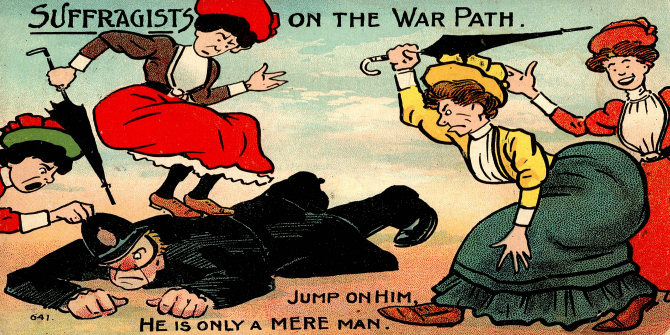
Shame and the Anti-Feminist Backlash is a transnational history of emotions, (anti-)feminism and nationalism. It is a study of the emotional tactics used by women in the attempt to prevent their own enfranchisement. In particular, it is an examination of the use of shame as an emotional tool in the highly divisive realm of gender politics in and across Britain, Ireland and Australia between 1890 and 1920.
The phenomenon of women opposing their own political advancement is puzzling. As such, it is often misunderstood or, given the eventual success of the ‘votes for women’ campaign, dismissed as irrelevant. In this book, I look not only at the reasons why anti-suffrage women assumed the position they did – a stance that placed them on the losing side of history – but I also examine the emotional strategies they adopted.
Published in the year that sees Britain and Ireland celebrate the centenary of the granting of the female franchise, the book casts light on the women who feverishly opposed organised feminism. It showcases the diversity of the politics of womanhood. It is compelled by questions such as: why were women leading such a vitriolic backlash against the campaign for women’s advancement? What had they to gain from participating in this very public, very bitter campaign? What emotional tools did they deem appropriate to police womanhood? And why was shame a tool in gender politics?
The politics of empire shaped the experiences of suffragists and anti-suffragists alike in all three sites examined in the book. Imperial ties connected women across Britain, Ireland and Australia, and women in each country referenced each other’s campaigns, whether such connections were welcome or not. Whether loyal or disloyal, each group of national womanhood had to frame their aspirations by referencing existing assumptions: for instance, about their country’s position on the hierarchical imperial spectrum or about the nature of British or non-British values.
For example, women at the centre of a vast imperial network were under pressure to represent imperial values, such as ‘civilisation’ and ‘respectability’. Publicly aping the habits and duties of men threatened Britain’s reputation as global upholders of those values. In the far-flung peripheries of empire, reluctant women voters – those who had opposed their own enfranchisement – were dedicated to voting in a way that upheld Australia’s reputation as a loyal member of the empire’s family of nations. In an increasingly fervent anti-colonial nationalist setting, Irish women were embroiled in vitriolic debates about whether or not to ‘beg’ the virulent British coloniser for a right to vote in an enemy imperial parliament.
Shame politics connected each site but were manifested differently in each country. Whereas Australian women worked to deflect any accusations of shameful conduct on the part of their young, white, aspiring nation, women in Britain felt that to bring shame on the relatively insignificant colonies meant something very different to dishonouring the centre of a vast imperial network. Irish women, on the other hand, struggled with the burden of whether or not joining their British sisters in demanding the vote in an enemy British parliament would bring more shame to a colonised Irish manhood and Irish nation.
There have been a number of fabulous studies that have examined suffrage politics in their transnational settings, whether from the point of view of the imperial centre, the perspective of those involved in feminist campaigns in the Antipodes or in tense anti-colonial sites like Ireland. My experiences as an historian of nationalist, imperial and gender politics, born in Ireland, now working in Australia, have inspired me to look for connections between diverse groups of national womanhood, while also respecting the uniqueness of different gendered cultures. This book, rather than collecting essays on different groups of national suffragists or plotting one national group’s interactions with the international movement, examines three groups of political women, connected by virtue of their opposition to the female franchise and their relative positions on the British imperial spectrum, to see if they forged emotional strategies that were national or transnational in character.

No comments:
Post a Comment